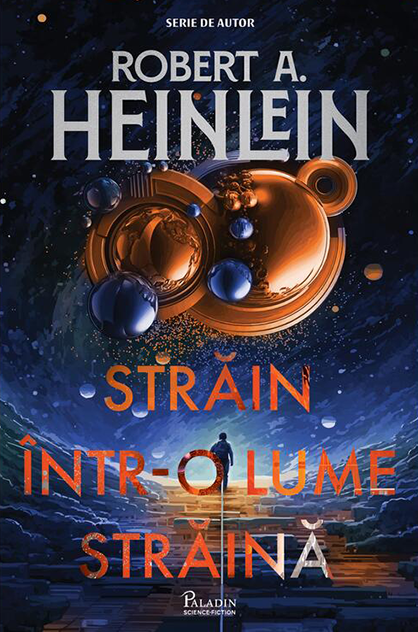- Rating: ★★★☆☆
- Editura: Art, imprint Paladin Science-Fiction
- Traducere: Gabriela Petrilă
- Pagini: 752
- Goodreads: Străin într-o lume străină
- Poate fi cumpărată de aici: https://www.editura-paladin.ro/info/carte/strain-intr-o-lume-straina-serie-de-autor
„Străin într-o lume străină” de Robert A. Heinlein este o carte care m-a pus serios pe gânduri, dar care, în același timp, m-a obosit destul de mult prin felul în care este scrisă și prin ideile greu de urmărit. Deși are momente interesante și un personaj principal aparte, nu pot spune că am fost pe deplin prinsă de poveste.
Personajul central este Valentine Michael Smith, un tânăr născut pe Marte, crescut de marțieni, care ajunge pe Pământ după mulți ani. El nu înțelege deloc lumea oamenilor – nu știe ce sunt banii, religia, rușinea, sau iubirea în sensul uman. Privește totul cu ochi curioși, ca un copil, și trebuie să învețe să fie… om. De aici vine și ideea titlului: este un străin într-o lume străină.
La început, Michael este ținut sub supravegherea guvernului, pentru că este moștenitorul unei averi mari și pentru că originea lui trezește interes politic. Apoi este „răpit” de o asistentă curajoasă, Jill, care îl ajută să fugă și îl duce la un scriitor bătrân și rebel, Jubal Harshaw. Jubal devine o figură importantă – un fel de mentor care îl învață pe Michael despre umor, drepturi, manipulare, și tot felul de lucruri omenești. Personajul lui Jubal mi s-a părut interesant la început, dar uneori vorbește prea mult și are un aer superior care m-a cam deranjat.
Pe măsură ce Michael învață despre oameni, își formează propriile idei. Vrea să construiască o nouă societate, unde iubirea este liberă, sufletul este important, iar oamenii se „grok”-uiesc – un cuvânt marțian greu de tradus, care înseamnă ceva între „a înțelege complet” și „a deveni unul cu celălalt”. Își face adepți, își creează o comunitate, dar felul în care lucrurile se dezvoltă mi s-a părut ciudat și greu de acceptat.
Cartea este plină de teme filosofice și sociale – religie, sexualitate, libertate, ipocrizie. Unele idei sunt curajoase și interesante, mai ales pentru vremea în care a fost scrisă cartea (anii ’60), dar de multe ori am simțit că autorul încearcă să mă convingă de ceva, în loc să-mi arate prin acțiuni sau emoții. De asemenea, multe pasaje sunt lungi și încărcate de discursuri și explicații, ceea ce mi-a tăiat din plăcerea lecturii.
Per total, mi s-a părut o lectură greoaie, cu idei bune, dar expuse într-un mod prea teoretic. Nu m-am atașat de personaje și nici nu am simțit emoție. I-am dat trei stele pentru că are curajul să pună întrebări importante, dar stilul și felul în care a fost scrisă nu m-au prins cu adevărat.


Stranger in a Strange Land – Robert A. Heinlein
“Stranger in a Strange Land” by Robert A. Heinlein is a book that really made me think, but at the same time, it also tired me out quite a bit due to the way it’s written and the complexity of its ideas. Although it has some interesting moments and a unique main character, I can’t say I was fully drawn into the story.
The central character is Valentine Michael Smith, a young man born on Mars and raised by Martians, who arrives on Earth after many years. He doesn’t understand human society at all—he has no concept of money, religion, shame, or love in the human sense. He looks at everything with curious eyes, like a child, and has to learn how to be… human. That’s where the title comes from: he’s a stranger in a strange land.
At first, Michael is kept under government supervision because he is the heir to a large fortune and because his origin sparks political interest. Then he’s “rescued” by a brave nurse, Jill, who helps him escape and takes him to an old, rebellious writer named Jubal Harshaw. Jubal becomes an important figure—a sort of mentor who teaches Michael about humor, rights, manipulation, and all sorts of human things. I found Jubal’s character interesting at first, but sometimes he talks too much and has a superior attitude that bothered me.
As Michael learns about people, he begins to form his own ideas. He wants to build a new society where love is free, the soul matters, and people “grok” each other—a Martian word that’s hard to translate, meaning something between “to fully understand” and “to become one with someone else.” He gains followers and creates a community, but the way things unfold felt strange and hard for me to accept.
The book is full of philosophical and social themes—religion, sexuality, freedom, hypocrisy. Some ideas are bold and interesting, especially for the time when the book was written (the 1960s), but many times I felt like the author was trying to convince me of something rather than showing it through actions or emotion. Also, many passages are long and packed with speeches and explanations, which took away some of the enjoyment for me.
Overall, I found it to be a heavy read, with good ideas presented in a way that was too theoretical. I didn’t get attached to the characters, and I didn’t feel much emotion. I gave it three stars because it has the courage to ask important questions, but the style and writing didn’t really engage me.

